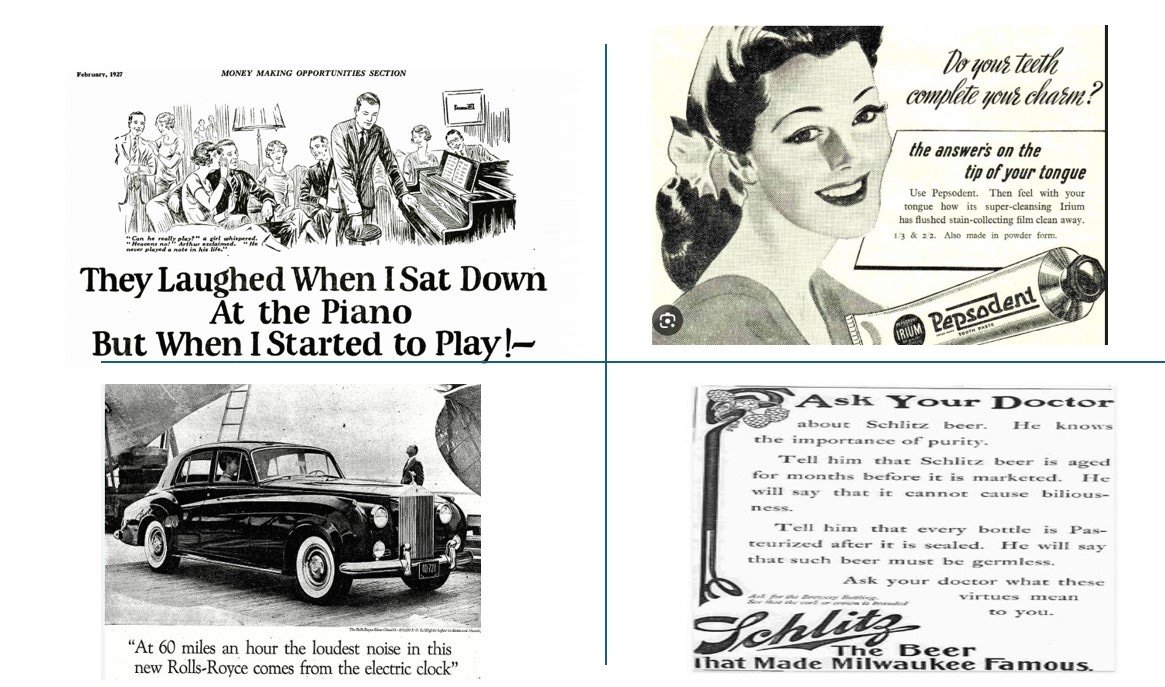They Wrote The Rules of Digital Marketing... A Century Ago…Before Computers Existed
From Hopkins and Schwartz to Ogilvy and Caples
Image Source: Kickstart Side Hustle and Swiped.co (More Creatives at the end of the article)
Winston Churchill said "The farther backward you can look, the farther forward you are likely to see."
Most "revolutionary" marketing strategies today were actually figured out nearly a century ago by a handful of geniuses who never saw a smartphone, never clicked an ad, and never heard of social media.
Yet somehow, they understood human psychology so deeply that their insights still drive successful campaigns in our AI-powered world.
I've spent years diving deep into the works of these marketing pioneers, and what I've discovered has given me better perspective on modern marketing. Their insights weren't just clever; they were revelations about human nature that have stood the test of time.
These 4 pioneers stand out
Claude Hopkins (1866-1932), a man who turned advertising from an art into a science, was writing about split testing and data-driven decisions when most businesses still thought advertising was about clever slogans. He is widely credited with revolutionizing the usage of toothpaste as a part of daily brushing habit (from 7% to 65%) through his iconic Pepsodent campaign.
Eugene Schwartz (1927-1995) mapped out the buyer's journey decades before we had digital funnels.
David Ogilvy (1911-1999), often called the "Father of Advertising," showed us the power of clarity when most ads were trying to be clever.
And John Caples (1900-1990) was crafting viral headlines before anyone knew what "going viral" meant.
What fascinates me most is how their principles have stood the test of time in our AI age –
The Foundation: Human Nature Remains Constant
Human behavior is governed by the same psychological triggers today as it was a century ago. People are drawn to solutions for their problems, captivated by compelling stories, and driven to act when emotions like curiosity, fear, or hope are tapped into.
These pioneers understood these principles and applied them masterfully in their work, creating campaigns that resonated deeply with audiences.
1. The Art of Meeting Your Audience: Schwartz's Revolutionary Framework
I remember when I first read Eugene Schwartz's "Breakthrough Advertising" (1966) – it was like finding a marketing time capsule that explained everything happening in modern digital marketing. Schwartz wasn't just ahead of his time; he understood something timeless about human psychology that most marketers follow
His awareness stages framework remains remarkably relevant:
Unaware Stage: Your prospect doesn't recognize their problem yet
Problem Aware: They feel the pain but haven't identified solutions
Solution Aware: They're exploring potential solution categories
Product Aware: They're comparing specific providers
Most Aware: They're ready to act, just waiting for the right moment
What blows my mind is how perfectly this maps to modern marketing funnels.
Every sophisticated marketing automation platform today is essentially just executing Schwartz's framework at scale – isn’t that nuts ?
2. The Scientific Method in Marketing: Hopkins' Testing Revolution
When I first read Claude Hopkins' "Scientific Advertising" (1923), I was stunned by how ahead of its time it was. Here was a man in the 1920s, without computers or analytics tools, insisting that marketing should be scientific and data-driven.
His famous quote still gives me chills:
Almost any question can be answered, cheaply, quickly and finally, by a test campaign.
Sound familiar? It's exactly what we do today with test-and-learn approach
What's fascinating is how Hopkins was essentially doing A/B testing with newspaper ads and direct mail decades before digital marketing existed. He would run different versions of ads in different markets, track the results meticulously, and use that data to optimize his campaigns.
3. The Customer Research Imperative: Hopkins' Legacy
Hopkins' approach to customer research in early 19th century sounds like something that a sophisticated brand team at CPG company would undertake. His mantra, "The customer is the hero of the story” is the basis of all storytelling
I love sharing his Schlitz Beer campaign story because it perfectly demonstrates how deep customer understanding transforms marketing. Hopkins didn't just list features; he told the story of how the beer was made, featuring the plate-glass rooms where beer dripped over pulverized wood, the four-thousand-foot artesian wells, and the bottles sterilized four times. Every other beer was made the same way, but Hopkins was first to tell the story in a way that connected with customers.
4. The Power of the Hook: Caples' Headline Revolution
John Caples is perhaps my favorite marketing pioneer to study because his work on headlines is more relevant than ever. In our world of endless scrolling and three-second attention spans, his insights about stopping power are crucial.
His most famous headline, "They laughed when I sat down at the piano. But when I started to play..." isn't just clever copywriting – it's a masterclass in psychological triggers. It hits multiple emotional notes: curiosity, redemption, social proof, and transformation.
5. The Clarity Imperative: Ogilvy's Lasting Impact
David Ogilvy was known as the "Father of Advertising," but I think of him as the grandfather of modern brand storytelling. His Rolls-Royce headline – "At 60 miles an hour, the loudest noise in this new Rolls-Royce comes from the electric clock" – is a perfect example of his genius for clarity.
What strikes me most about Ogilvy's work is how he could take something complex (like the engineering excellence of a Rolls-Royce) and distill it into a single, powerful image that anyone could understand instantly. In today's world of information overload, this skill is more valuable than ever.
The Modern Synthesis: Where Past Meets Present
After studying these pioneers, I've come to see modern marketing tools in a new light.
- When we use AI to test headlines, we're building on Caples' work
- When we create sophisticated customer journeys in marketing automation platforms, we're executing Schwartz's awareness stages at scale
- When we run multivariate tests on landing pages, we're following Hopkins' scientific approach
- When we craft clear, compelling social media posts, we're applying Ogilvy's principles of clarity
When I see the latest AI tools or social media platforms, I can't help but smile thinking about what Hopkins or Ogilvy would say.
They'd probably tell us we've finally built the tools to execute what they knew all along a century ago– that marketing is fundamentally about understanding human nature, and that never changes.
Every time we use AI for campaign optimization, we are just using advanced technology to apply principles these masters discovered through careful observation and testing a century ago...
So, here’s to Hopkins, Ogilvy, Schwartz, and Caples—our timeless guides in a world that’s always evolving but never changing where it matters most
Understanding people, speaking to their desires, and telling a story that resonates.
More creatives below






